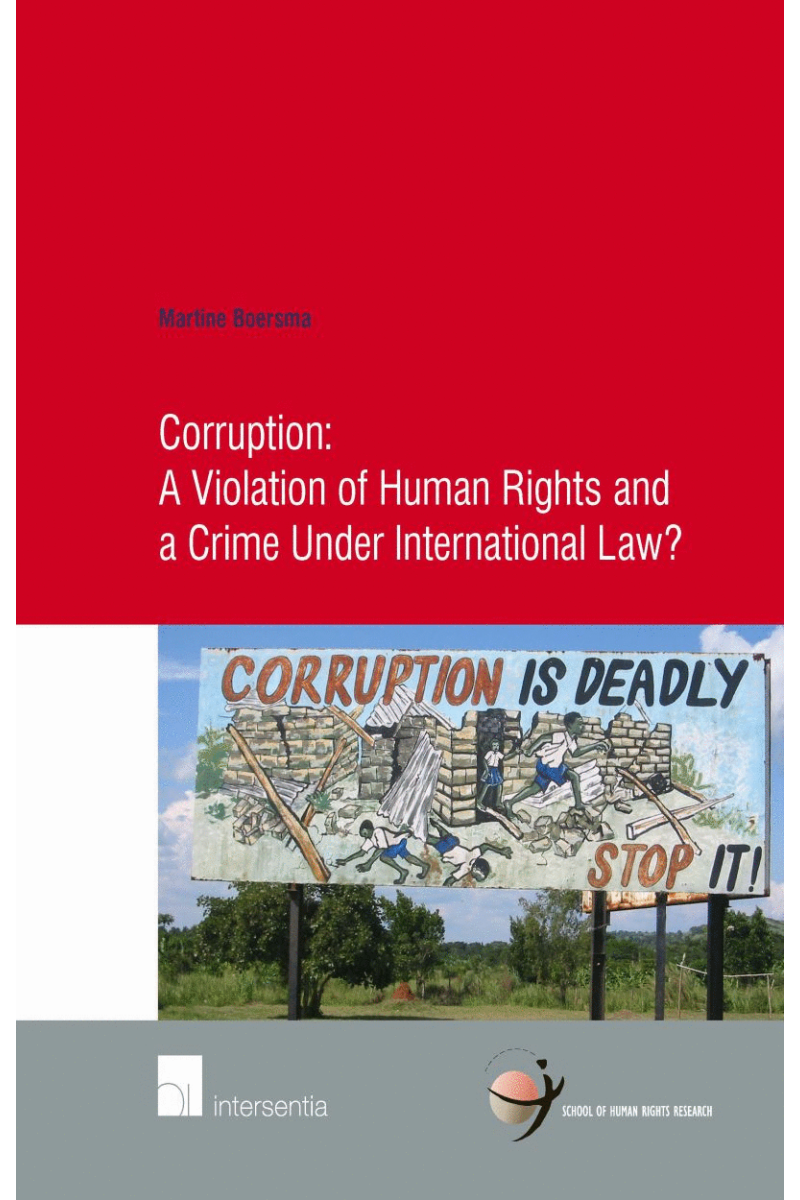 maestro
mastercard
visa
maestro
mastercard
visa

Corruption: A Violation of Human Rights and a Crime Under International Law?

Corruption, being the abuse of public office for private or political gain, currently receives an increasing amount of attention from scholars and practitioners in various disciplines, including law. While the phenomenon is as old as mankind, the last fifteen years saw the rise of many anti-corruption treaties, aimed at criminalisation, prevention and cooperation. At the same time, there seems to be relatively little work done on corruption in the field of human rights law or international criminal law. This book argues that these areas of law can certainly contribute to fighting corruption, by giving a human face to both victims and perpetrators.
The study commences with Part A, containing a broader analysis of the ‘multi-headed monster’ named corruption, looking into issues of definition, measurement, and consequences. This is followed by an overview of the content and functioning of the global and regional anti-corruption treaties that are currently in force, including the United Nations Convention Against Corruption.
Hereafter, Part B considers whether or not types of corruption can be qualified as a violation of internationally recognised human rights, enshrined in the International Bill of Rights. It is argued that corruption, especially in the public sector, can have a severe negative impact upon both civil and political rights, as well as upon economic, social and cultural rights. Moreover, the study examines to what extent this is recognised by the human rights supervisory mechanisms at the global and regional level. The concluding observations and case law of the human rights treaty bodies are scrutinised, as well as the outcomes of the various Special Procedures and the Universal Periodic Review System of the UN Human Rights Council. At the regional level, the case law of the European Court of Human Rights, the Inter-American Commission and Court of Human Rights, as well as the cases of the African Commission on Human and Peoples’ Rights are discussed.
Furthermore, Part C of the book aims to view corruption from the angle of international criminal law, inter alia by examining whether or not types of corruption can be qualified as a crime under international criminal law. In this context, the question is answered whether corruption can fall under the current provisions of the Rome Statute of the International Criminal Court de lege lata. Also, the various possibilities offered by international criminal law de lege ferenda to combat corruption are touched upon.
Finally, Part D draws conclusions and formulates recommendations as to how human rights law and international criminal law can best be used to address corruption. This includes a draft General Comment on corruption and human rights, with the purpose of providing a starting point for further reflection on the topic.
About this book
‘Boersma’s comprehensive treatment of the issue of corruption from the perspectives of human rights law and international criminal law deserves praise, and this book will serve as an indispensable guide for researchers in this area.’
Cecily Rose in Netherlands International Law Review (2014) 455
| Type of product | Book |
|---|---|
| Format | Paperback |
| EAN / ISSN | 9781780681054 |
| Series name | Human Rights Research Series |
| Weight | 861 g |
| Status | Available |
| Number of pages | xxiii + 491 p. |
| Access to exercice | No |
| Publisher | Intersentia |
| Language | English |
| Publication Date | Sep 7, 2012 |
| Available on Strada Belgique | No |
| Available on Strada Europe | No |
| Available on Strada Luxembourg | No |
Downloads
- Table of Contents
- General Introduction
- PART A. THE PHENOMENON OF CORRUPTION: AN INTRODUCTORY ANALYSIS
- Chapter I. Basic Issues
- Chapter II. Global and Regional Legal Framework Against Corruption
- PART B. RESPONSIBILITY OF STATES: CORRUPTION AS A VIOLATION OF HUMAN RIGHTS?
- Chapter III. Treaty-Based System: Corruption as a Topic in the Work of the UN Human Rights Treaty Bodies
- Chapter IV. Charter-Based System: Corruption as a Topic in the UPR and the Special Procedures of the UN Human Rights Council
- Chapter V. Regional Human Rights Practice on the Topic of Corruption
- Chapter VI. Taking It Further: Corruption as a Human Rights Violation
- PART C. INDIVIDUAL RESPONSIBILITY: CORRUPTION AS A CRIME UNDER INTERNATIONAL LAW?
- Chapter VII. Situating Corruption Within International Criminal Law
- Chapter VIII. Corruption as a Crime Against Humanity under International Law de lege lata?
- Chapter IX. Possibilities of Combating Corruption under International Criminal Law de lege ferenda?
- PART D. SUMMARY, REFLECTIONS AND RECOMMENDATIONS
- Chapter X. Summary
- Chapter XI. Reflections and Recommendations
- Samenvatting
- Annex 1. Overview of Concluding Observations on Corruption
- Annex 2. General Comment on Corruption and Human Rights: A Draft Proposal
- Bibliography
- United Nations Documents
- Table of Cases
- Index
- Curriculum Vitae